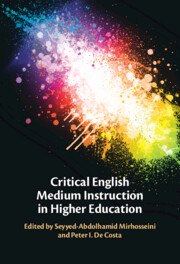Book contents
- Critical English Medium Instruction in Higher Education
- Critical English Medium Instruction in Higher Education
- Copyright page
- Contents
- Figures and Tables
- Contributors
- Foreword
- 1 Critical Views of English Medium Instruction
- Part I Ideologies and Educational Policies
- 2 Conceptualisations of English in an Italian EMI Context
- 3 Ideologies of Language Use in an EMI University in Hong Kong
- 4 Burdening EMI with Unnecessary Baggage
- 5 Entrepreneurial Orientations towards Language and Education
- 6 A Critical Approach to the Rise of EMI
- Part II Identity and Educational Justice
- Part III The Politics of English in Education
- Afterword
- Index
- References
5 - Entrepreneurial Orientations towards Language and Education
EMI Policy in Kazakhstan
from Part I - Ideologies and Educational Policies
Published online by Cambridge University Press: 31 January 2025
- Critical English Medium Instruction in Higher Education
- Critical English Medium Instruction in Higher Education
- Copyright page
- Contents
- Figures and Tables
- Contributors
- Foreword
- 1 Critical Views of English Medium Instruction
- Part I Ideologies and Educational Policies
- 2 Conceptualisations of English in an Italian EMI Context
- 3 Ideologies of Language Use in an EMI University in Hong Kong
- 4 Burdening EMI with Unnecessary Baggage
- 5 Entrepreneurial Orientations towards Language and Education
- 6 A Critical Approach to the Rise of EMI
- Part II Identity and Educational Justice
- Part III The Politics of English in Education
- Afterword
- Index
- References
Summary
The chapter situates the English Medium Instruction (EMI) policy and practices within a private university in part of Kazakhstan to gather the perspectives of the users to examine their orientations towards the use of EMI, the potential they see in the EMI policy, and their perceptions of the widespread expansion of the English language industry in the local market. The study employed qualitative interviews with students, teachers, and administrators. The participants’ perspectives show their entrepreneurial orientations towards English, evident in their repeated discourses of the English language as potential capital and a key to global competitiveness. They also endorse the intense pursuit of EMI policy in Kazakhstan because, as they understand, individual as well as governmental-level investment in English-related language skills make brighter promises and prospects in the current global economy. English is also believed to enhance Kazakhstani citizens’ global competitiveness. In theoretical terms, these orientations are deeply interwoven with the core principles of neoliberalism and neoliberal rationality, characterized by terms such as capital, globalization, global competitiveness, economic advantage, market logic, and private investment.
- Type
- Chapter
- Information
- Critical English Medium Instruction in Higher Education , pp. 70 - 86Publisher: Cambridge University PressPrint publication year: 2025

